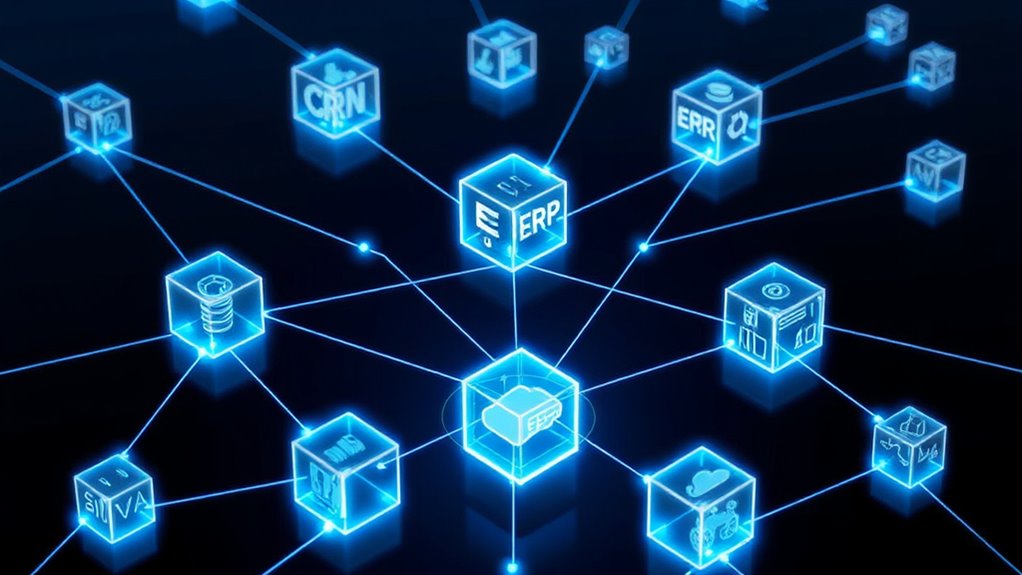iPaaS solutions serve multiple critical business functions, including real-time data synchronization across platforms, seamless application integration for workflow automation, and efficient data migration to cloud environments. Organizations utilize iPaaS to streamline processes like employee onboarding, order processing, and supply chain operations while ensuring consistent data flow between CRM, ERP, and marketing systems. This technology enables businesses to reduce manual tasks, eliminate data silos, and improve operational efficiency through no-code interfaces – important capabilities that can transform enterprise operations.

Every modern enterprise requires seamless integration of its various software applications and data sources to operate efficiently. Integration Platform as a Service (iPaaS) solutions facilitate this by providing extensive tools for connecting different systems, applications, and data repositories across an organization’s technology landscape.
Data synchronization represents a fundamental use case for iPaaS, ensuring real-time consistency of customer and operational data across multiple platforms. Organizations can synchronize their marketing automation systems with CRM and ERP platforms, providing teams across sales, marketing, and fulfillment with instant access to updated customer activities and preventing problematic data silos. The platform’s no-code interface enables non-technical users to create and manage these data synchronization tasks effectively. Dynamic forms and conversational AI facilitate automated data gathering directly from end users without excessive communication cycles.
Real-time data synchronization across platforms eliminates silos and empowers teams with instant access to critical customer information.
Application integration through iPaaS enables the merger of distinct business logic to create efficient workflows. This includes automated record creation, such as generating Salesforce entries from marketing leads, and streamlining complex processes like insurance underwriting and case management. The technology supports automated inter-application communication without manual intervention, driving broader business process improvements. Companies leveraging workflow automation can significantly reduce operational costs while improving accuracy in their business processes.
Organizations frequently utilize iPaaS for data migration projects, particularly when shifting from legacy or on-premises systems to cloud environments. This capability proves essential for enterprises upgrading to modern ERP systems or consolidating multiple data sources for improved cost efficiency and centralization.
Process automation represents another vital iPaaS use case, streamlining routine business workflows through pre-defined rules and triggers. Companies can automate employee onboarding, credit application approval, and order processing while reducing operational costs and errors through codeless automation flows.
iPaaS solutions excel in system and cloud integration, connecting legacy systems with modern cloud platforms for unified data access. This proves particularly valuable in manufacturing environments, where production data from older systems must integrate with cloud-based ERP solutions for operational insights.
B2B integration and supply chain automation through iPaaS streamline external partner communications and automate essential supply chain events. This includes order processing, inventory updates, and shipping notifications, greatly reducing delays in partner-to-partner transactions and enhancing eCommerce operations through real-time multi-party data flows.
Frequently Asked Questions
How Much Technical Expertise Is Required to Implement an Ipaas Solution?
Technical expertise requirements for iPaaS implementation vary based on the chosen platform approach.
Code-based solutions demand advanced programming skills, while low-code and no-code platforms enable business users with minimal coding experience to build integrations.
Even with simplified platforms, understanding data structures and business processes remains beneficial.
Complex scenarios typically require IT professionals, particularly for custom workflows, security configurations, and compliance requirements.
What Security Measures Are Typically Included in Ipaas Platforms?
Modern iPaaS platforms incorporate multiple layers of security measures to protect data and systems.
These typically include:
- Advanced encryption (AES-256) for data in transit and at rest
- Role-based access control and multi-factor authentication
- End-to-end encryption and tokenization for sensitive information
- API security with OAuth protocols and key management
- Compliance certifications (ISO 27001, SOC 2)
- Real-time threat monitoring and intrusion detection systems
- Extensive audit trails and logging capabilities
Can Ipaas Replace Traditional Middleware Solutions Completely?
iPaaS cannot completely replace traditional middleware in all scenarios.
While iPaaS excels in cloud-based integrations and offers superior scalability, some organizations require middleware for specialized legacy systems, strict compliance requirements, or performance-critical operations.
Many enterprises opt for hybrid approaches, combining iPaaS with existing middleware to address diverse integration needs.
Factors like existing infrastructure investments and specific technical requirements often necessitate maintaining some middleware components.
What Are the Typical Pricing Models for Ipaas Platforms?
iPaaS platforms typically employ three main pricing models.
Subscription-based models offer fixed monthly or annual fees with tiered feature sets.
Usage-based pricing charges according to consumption metrics like API calls or data volume.
Tiered pricing provides predetermined packages with specific capabilities and limits.
Many vendors combine these approaches, often adding setup fees, premium features, or consulting services as separate costs.
Some platforms also offer freemium options for initial adoption.
How Long Does It Take to Deploy and Configure an Ipaas Solution?
iPaaS deployment typically takes several weeks, though timeframes vary based on project complexity.
Organizations with clear requirements and pre-built connectors can achieve implementation in 2-4 weeks.
Complex enterprise deployments may extend to 8-12 weeks.
Key factors affecting duration include:
- Number of applications to integrate
- Data complexity
- Internal IT expertise
- Custom API requirements
- Organizational readiness
- User training needs
Platform selection and proper planning greatly impact deployment speed.









